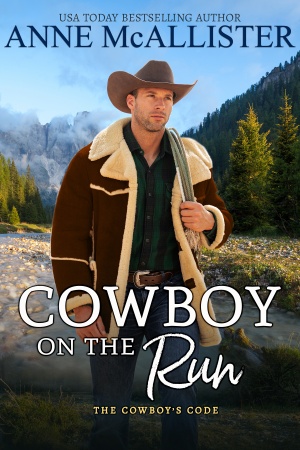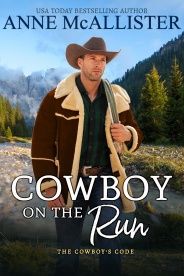Start reading this book:

Share This Excerpt
It was the tour bus that did it.
One minute Rance Phillips was entirely focused on the dark red Simmental calf he’d roped and thrown to the ground for branding amid the sound and fury of bawling mother cows, bleating calves and the cussing and whooping of half a dozen cowboys.
And the next moment everything stopped.
The low mechanical drone in the background, which had seemed like no more than the result of a shift in the wind bringing the sound of truck engines on the highway a half mile distant, suddenly grew very loud indeed.
“Will you look at that,” J.D. Holt, his foreman, said.
Instead of branding the calf, Shane Nichols, who was wielding the iron, stood straight up and did just that.
His brother, Mace, who was supposed to be vaccinating, straightened too. He took off his hat and said, “Now I’ve seen everything.”
And Cash Callahan, who was turning baby bulls into steers, looked up, dropped the knife, and whistled. “Whooo-eeeee.”
“What the hell—?” Rance demanded. He tightened his hold on the calf. “This isn’t a Sunday school picnic, you know. Pay attention!”
They were paying attention. Just not to him. Disgusted, Rance finally looked up to see for himself what was going on.
A tour bus—a neon pink tour bus—was pulling to a stop just beyond the confines of the corral. Before he could say a word, the door to the bus opened and a horde of women spilled out.
“Ho-leee,” Shane breathed.
“Maybe I haven’t seen everything,” Mace mumbled.
“Wow.” A master of understatement, J.D. just shook his head and grinned as the women—all of them young, most of them pretty, and not one of them dressed appropriately for a branding—advanced toward the corral. They seemed oblivious to the cattle, but they were evidently looking for something—or someone. Their eyes darted from this cowboy to that one.
Then one of them pointed straight at Rance. “There he is!”
Oh, no! He didn’t believe it. Refused to believe it.
But no sooner had they spotted him than they made a beeline in his direction.
Rance muttered under his breath. He let go of the calf and, as it bolted, looked around for a bolt-hole of his own. There were none. The women descended en masse.
“Oooh! Rance! My name’s Jolie, Rance.”
“Ah, Rance. You’re even handsomer than your pictures.”
“Rance, baby! You probably don’t remember, but my mother and yours—”
The babble of female voices was deafening. They were getting closer, swarming over the corral fence.
Rance straightened up and took one more desperate glance around, saw the astonished and bemused faces of his friends and knew there was no hope for it. He had to stand his ground.
So he did, but he was furious. For the last four months—ever since that damned article in the magazine, Global Style, had named John Ransome Phillips, IV “one of the world’s most eligible bachelors”—Rance’s life hadn’t been the same.
He had been used to women batting their lashes at him. As he’d grown to adulthood, he’d become accustomed to occasionally turning heads and hearing muffled female giggles when he looked their way.
But he’d never in his life get accustomed to this. Everywhere he went now, women ogled him. They turned up in his law office, they followed him down the street. If he went into the grocery store, they trailed him down the aisles. If he ran into town for baling wire, women stampeded into the hardware store. They brushed up against him and wiggled their hips in front of him. They tucked their phone numbers into his pocket and patted his butt!
The ones enterprising enough to have discovered his cell phone number called him at three in the morning to chat. And if that wasn’t bad enough, his work was suffering, too. His receptionist-cum-secretary, Jodi, couldn’t get any work done either, because she was always making appointments for single women who desperately needed legal advice from John Ransome Phillips, IV, about cases that didn’t exist.
Last month he finally caved in and stopped letting her answer the phone. Now there was a blasted phone tree intercepting calls—not that it slowed them down much. He bought an answering machine that screened out all unknown numbers from the landline. Recently he’d stopped going to the grocery store, the hardware store, anywhere off the ranch at all, except to court or to his office.
It still hadn’t been enough.
Lately they’d begun turning up at the ranch. Last Monday evening he’d answered the door, expecting his accountant, and found instead a blonde whose car “just happened to break down” in his driveway—no matter that his “driveway” was a private five-mile gravel road from the nearest county highway.
On Tuesday after a harrowing day in court, during which most of the onlookers had been females more concerned with ogling him than with following the case, he’d found another hopeful female already there sipping a margarita on his front porch while she chatted with his father.
“You’re encouraging them!” he’d accused John Ransome Phillips, III.
“Me?” His father had flattened a hand against his chest and stared at Rance in wide-eyed innocence. “I never—!” The old bastard could’ve won an Oscar.
On Wednesday morning Rance discovered a brunette in the barn. She’d been there all night lying in wait for him.
“Proving I’m devoted,” she told him as he hustled her to her car. “The article said you wanted your wife to be ‘devoted.’” She quoted the magazine as he shoved her in and slammed the door.
It had also said he liked apple pie. So many pies had turned up in the mail over the past four months that the post office was getting a little testy about the smell of rotting apples in their delivery vans. Rance told them they didn’t need to bother delivering the pies, but the postmaster had cited some obscure regulation, assuring Rance that the pies had to keep coming.
Of course, half a dozen enterprising women hadn’t bothered with the postal service or any other delivery service. They’d shown up with their pies in person.
Rance felt hunted. Stalked. “I need a restraining order,” he told his father.
The older man blinked. “Against half the human race?” Then, at Rance’s stony look, his father suggested cheerfully, “You could get married. That would put a stop to it.”
Of course his father would say that. The earlier protestations of innocence were protestations and nothing more. It was no secret that John Ransome Phillips, III, was eager for his only son to marry. For the last two years, Trey Phillips, as he was known to friend and foe alike, had been telling the world at large, and his son in particular, that he wasn’t getting any younger and he wanted to be assured of the succession before he was gone.
“Like you’re some damn king,” Rance fumed.
“Something like that,” Trey agreed amiably.
They hadn’t discussed the topic again. Trey had continued to watch Rance speculatively, and Rance had taken refuge where he could—on the range. It was the one place he could count on not being followed.
Until now.
Rance reached over and grabbed the branding iron from Shane, then pointed the white-hot end of it at the approaching women. Their eager smiles faded. They looked around nervously, at him, at each other, then back toward the bus.
They slowed momentarily, but then, with foolhardy resolution, they came on.
Rance dug in. He brandished the iron. He narrowed his eyes. “Go away. Go on. Outa here. Now. Git!”
The women halted. They cocked their heads. They wetted their lips. They mustered tremulous, come-hither smiles.
“Don’t pay any attention to them, sweetheart,” the foremost one crooned, jerking her head at the women behind her. “They don’t have what you want.”
“You don’t want a pushy broad like her,” the blonde behind her said, smiling, encouraging him to agree with her. “Do you, Rance, darlin’?”
“I only came on the bus because it seemed less intrusive,” another one protested. “An organized event to let you take your pick,” she said, sounding as if she was quoting from some brochure.
And damn it, she probably was. Rance goggled at the thought. His mind reeled. Somebody had organized a tour to bring women to meet him? Who the hell—!
And then a movement in the doorway of the bus answered his question before he even had a chance to ask it. Trey stood there, one arm braced again the window, smiling at him.
It was the last straw.
Damn Trey and his conniving, manipulating, underhanded ways.
Rance leveled the branding iron at the women and headed straight at them. The women began backing up.
“Hey now, Rance,” he heard behind him. “Don’t be so hasty,” J.D. protested.
Rance ignored him. He could find his own women on his own time. His father had no business providing a harem of them right out in the middle of the branding.
“Now, son,” Trey began. He jumped down out of the bus and began to push his way through the gaggle of retreating women.
“Don’t start,” Rance warned. “I don’t want to hear it.”
“It was a joke,” Trey said, spreading his hands.
“I’m not laughing.”
“Of course you’re not—because you recognize the truth in it. You know it’s time you settled down,” his father pointed out, heedless of the fury in Rance’s tone. “You’re thirty-three years old and you’re still playing the field. If you’d get serious about finding a wife yourself, none of this would be happening.”
He was serious. Rance could see it in his father’s face. In the determined thrust of his jaw. In the steely glint that shone in his version of the Phillips blue eyes.
He was serious, totally misguided, and about a century out of date. But Rance knew his father. The old man wasn’t going to let up.
The penalty for patricide in Montana was greater than Rance wanted to pay. But not by much.
Rance supposed he was a little old to be running away from home.
But he didn’t know what else you’d call it. And he didn’t know what else to do.
He needed space. He needed time. He needed room to breathe. And he wasn’t going to get any of those things as long as he stayed on the family ranch and battled his way through a passel of women every day of the week.
So he finished the branding, endured the grins and guffaws of his buddies, and gritted his teeth through one more evening of Trey Phillips’s heavy-handed hints—and when the old man had retired to his bedroom with a western and a glass of whiskey, Rance left a phone message for his secretary, threw some clothes into a duffel bag, and jumped in his truck and took off without looking back.
He had no goal or destination in mind. Didn’t need one. Didn’t want one.
He’d had too damn many goals and destinations of late.
“Phillipses have goals,” Trey said so often that Rance reckoned it ought to be carved on a family crest. Rance had grown up with a hundred goals all laid out before him. As a youngster, he’d been goaled to death.
At eighteen, when he’d seen his life mapped out for him by his father, he’d had enough. He didn’t want to grow up, grow old and die without ever making a decision of his own. So he’d turned his back on his old man’s goals, rejected his early acceptance at Princeton and had gone off to ride broncs on the rodeo circuit.
“To live,” he’d told his father defiantly.
“Not on my money,” Trey had replied at once.
“Not on your money,” Rance agreed. He didn’t want to be beholden. He’d been determined to make it on his own—or starve to death trying.
He might have if Shane Nichols, with whom he’d gone down the road, hadn’t been a better rider than he had. Shane had made enough money rodeoing to buy gas and groceries on days when Rance had nothing but lint in the pockets of his Wranglers. Without Shane, he might have had to pack it in, crawl home and eat humble pie.
But Shane had kept him going, had patched him up, jollied him along, taught him everything he knew. And Shane wasn’t the only one. Roughstock riders were a small, close-knit group—maybe not a family, but close. Once it was clear to them that Rance was in it for real, not just thumbing his nose at his rich daddy, other guys had taken him under their wing, offering him advice, beer, sandwiches, rides. Sometimes Rance thought that the three years he had spent going down the road from rodeo to rodeo had been the happiest time of his life.
He’d known, of course, that it wouldn’t last forever. Men didn’t get old still riding broncs. In fact most barely made it to middle age before they had to find another way to make a living.
Rance knew he would, too. But he hadn’t realized it would happen as quickly, as irrevocably as it had.
One minute he was looking forward to hopping in the truck with Shane after the Pendleton rodeo, and the next he was on his way to the operating room with a shattered right arm. Three months, a plate, several pins, and four doctors’ opinions later, he was hanging up his spurs and applying to Montana State for school.
“You give your arm a rest and you’ll come back,” Shane, ever the optimist, had assured him. But Rance had seen the worry and urgency written on Shane’s normally cheerful face. And the Phillips realism he’d been born with told him he’d seen the end of that dream. Rodeoing had given him a little breathing space. It was wrong to hope for more from it.
He had gone to school. He’d known he wanted the education by this point, even though it hadn’t been easy adjusting to the academic routine. In fact only two things made it palatable at all—the sweet little rancher’s daughter he met in his freshman English class and the fact that his father was furious that he still insisted on not going to Princeton.
The rancher’s daughter hadn’t returned for her sophomore year. But the satisfaction of his father’s displeasure lasted for the next four. And when Rance finally did graduate, he took further pleasure in choosing Harvard Law. He was quite sure Princeton was everything his father claimed it was. He’d also been sure it wasn’t for him.
Harvard hadn’t been his cup of tea, either. But he was determined, by that point, to show the old man that he could make something of himself on his own.
He had resolution. He had his own goals. He accomplished them.
In the past four years he had developed a thriving law practice with an office in Billings as well as in his hometown. Three high-profile cases, all of which he’d won, brought him state accolades and a share of media attention. It got him a share of his father’s, too. Trey had been so impressed that he’d invited Rance to dinner and managed to say he guessed maybe the kid was worth something after all.
“Don’t fall all over yourself gushing,” Rance had replied, never even looking up from the steak he was cutting.
“Wouldn’t think of it,” Trey said heartily. “Seein’s how you’re an educated feller now, even if you did go to that Massa-chew-sitts school, I wondered if you might want to take a look at the land deal Schyler’s offering me.”
Schyler was the man whose ranch covered the section adjacent to the Phillips spread. “Schyler’s offering to sell?” Rance had asked, his attention caught. From there it had been a small step for Rance to get back into the ranching operation.
He knew that had been his father’s intention all along. But to make sure Trey didn’t get everything his own way, Rance had insisted on driving back and forth from Billings where his apartment and his main office were. He’d worn a rut in the highway, he did it so often.
Actually he would have preferred staying at the ranch, but that would have meant coming back under the old man’s thumb—and there was no way he was doing that. Or there would have been no way, if last year his father hadn’t had a heart attack.
It was minor, Trey assured him. “No big deal,” he’d said over and over.
But Rance had been there when his father went ashen, when sweat literally popped out on his brow. He’d seen the pain in his father’s eyes and the grip it had on his body. It might not have scared Trey, but it frightened Rance enough that he moved back home and commuted the other way for a change.
Since he’d come back to the ranch, he’d taken over most of the day-to-day running of the cattle operation. He couldn’t believe how much he’d missed it. Rodeo had been a way to stay around horses when he’d left the ranch. But to be honest ranching had always interested him a lot more than rodeo ever had. It still interested him far more than the law did.
He still had his run-ins with the old man—as stubborn a cuss as ever was born, even after his heart attack. But for the most part Rance had dug in, settled down, enjoyed every moment.
Until that damn article had come out.
Its five pages of full-color photos set Rance’s teeth on edge. Its text extolled more virtues than even his deceased doting mother would ever have believed he had.
And if all that wasn’t bad enough, it ended by proclaiming, “We’d call John Ransome Phillips, IV, a golden boy—able to turn his hand successfully to whatever needs to be done—except he’s no boy, ladies. Rest assured, the woman who tries to put a brand on the very eligible John Ransome Phillips, IV, will learn that he’s one-hundred-percent Montana man.”
Yeah, well, they’d got that right at least, Rance thought as he gripped the steering wheel now and drove into the darkness.
More important, he was a determinedly unmarried Montana man.
And at the moment, thanks to them, he was a Montana man on the run.
End of Excerpt










